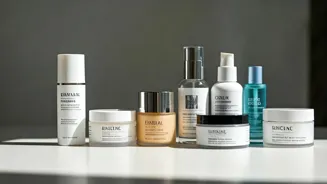Parlor Facials: Reality Check
Rubina Dilaik, a well-known figure, shared her perspective on the limitations of standard parlor facials, sparking a conversation about skincare practices.
Many often opt for these treatments hoping for a quick fix, however, Dilaik points out a crucial detail: most parlor staff may not be fully aware of individual skin types. The result is a one-size-fits-all approach that may not address specific needs. Without a thorough assessment of your skin's characteristics, you might not see the desired results, and in some cases, you could even experience adverse effects. It's essential to remember that what works for one person may not suit another.
Understanding Your Skin
The cornerstone of effective skincare lies in identifying your unique skin type. Is your skin oily, dry, combination, sensitive, or normal? Knowing this fundamental aspect is the first step towards selecting appropriate products and treatments. Understanding your skin’s tendencies allows you to tailor your skincare routine to address specific concerns. Oily skin benefits from light, oil-free products, while dry skin requires intense hydration. If you have combination skin, different areas of your face will need different care. Sensitive skin requires gentle, hypoallergenic products. Being aware of your skin's specific needs helps you avoid potential irritations and maximize the benefits of your skincare regimen.
Alternatives to Consider
Instead of relying solely on facials, explore alternative skincare approaches. Consider consulting a dermatologist or a qualified esthetician. These professionals can analyze your skin, identify its needs, and recommend personalized treatments. Another option is creating a tailored skincare routine at home. Research the ingredients and types of products best suited for your skin type, from cleansers and serums to moisturizers and masks. There are many resources online that provide detailed guides. Experiment with different products and techniques to find what works best for you. Always introduce new products gradually and observe how your skin reacts. Remember, consistency is key for long-term results.
Products That Matter
When curating your skincare routine, the ingredients you use are critical. Certain ingredients are beneficial for various skin types. For example, those with acne-prone skin might find that products containing salicylic acid and benzoyl peroxide are beneficial. Dry skin requires products that are rich in hydrating ingredients such as hyaluronic acid and ceramides. For sensitive skin, opt for gentle, fragrance-free formulas. Sunscreen is a universal necessity. Regardless of your skin type, daily use of a broad-spectrum sunscreen with a high SPF is essential to protect your skin from UV damage. Consider using vitamin C serums and retinoids, known for their anti-aging and skin-brightening properties. Always read the labels and research ingredients before incorporating them into your routine.
Healthy Habits: The Other Half
Skincare involves more than just products and treatments; lifestyle plays a huge role. Stay hydrated; drinking sufficient water benefits your skin’s hydration levels, giving it a plump, healthy appearance. A balanced diet rich in antioxidants contributes to skin health. Get adequate sleep. While you sleep, your skin repairs and regenerates cells, making it more radiant. Minimize stress, since stress can lead to flare-ups and skin issues. Practice good hygiene, and never go to bed with makeup on. Regularly wash your makeup brushes to prevent buildup of bacteria. A holistic approach that blends skincare with healthy lifestyle habits can lead to the best results and promote long-term skin health.












